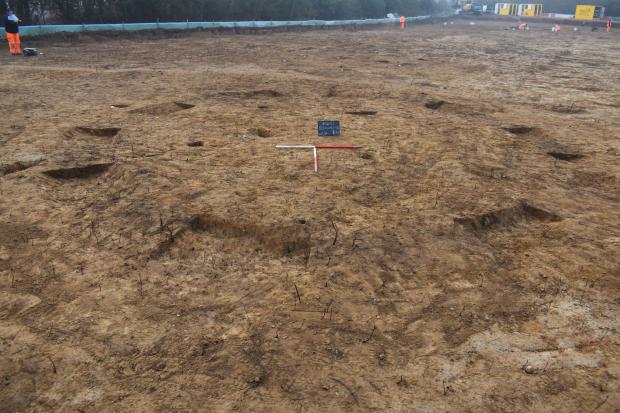A remarkable discovery has been made during the construction of a new link road in Ipswich: a 3,000-year-old settlement has been brought to light.
Archaeological excavations carried out as part of the Europa Way project in the town have revealed a settlement area and a cremation cemetery dating back to the Late Bronze Age (approximately 1200 BC). Radiocarbon dating results obtained from the 18 burials found in the cemetery confirmed this period.
In the excavation area near Bramford and Sproughton, postholes for two roundhouses, as well as numerous four and six-post structures and two ring ditches, were identified.
Other significant finds uncovered during the excavations include post-Deverel-Rimbury pottery, fragmented baked clay weights, cremation urns, copper alloy pins, and various worked flint artifacts such as a flint hand mill used for grinding grain into flour.
Chris Thatcher, senior project manager at Oxford Archaeology, commented: “The Bronze Age remains at Europa Way are a significant discovery for understanding prehistoric activity along the Gipping valley.” Thatcher emphasized the remarkable proximity of the cemetery to the settlement, stating, “One of the distinguishing features of this cremation cemetery was how close it was to buildings and daily life – suggesting that the inhabitants of the settlement were likely buried close by.” He further noted that this might indicate a shift in funerary practices emerging in the Late Bronze Age, differing from the Middle Bronze Age preference for large cemeteries, often within extensive land systems, or burying the dead in pre-existing ancestral monuments.
The discovered findings suggest that the settlement had a mixed agricultural economy, including grain production and animal husbandry.

This intense Late Bronze Age activity at the Europa Way site was identified on glacial outwash gravels outcropping on the lower slopes on the northern side of the Gipping River valley. Additionally, a rich record of prehistoric land use exists on the lighter soils of the terrace bordering the river’s course upstream of Ipswich.
Other archaeological investigations at the Europa Way site have also revealed human activity from different periods, including Neolithic pottery and Iron Age gold coins.
Councillor Philip Faircloth-Mutton, Suffolk County Council Cabinet Member for Environment, Communities and Quality, said regarding the discovery: “Once again, Suffolk has revealed its unique history, adding another layer to our understanding of what life was like for previous generations in our part of the world. This is why it is important that the council’s Archaeological Service is here to record and protect our past. However significant and interesting the finds are today, who knows how important this information could be for future generations.”
The complete archive of the finds will be deposited with the Suffolk County Council Archaeological Service, where it will be curated for future research and made accessible to researchers at all levels.
Cover Image: Oxford Archaeology





